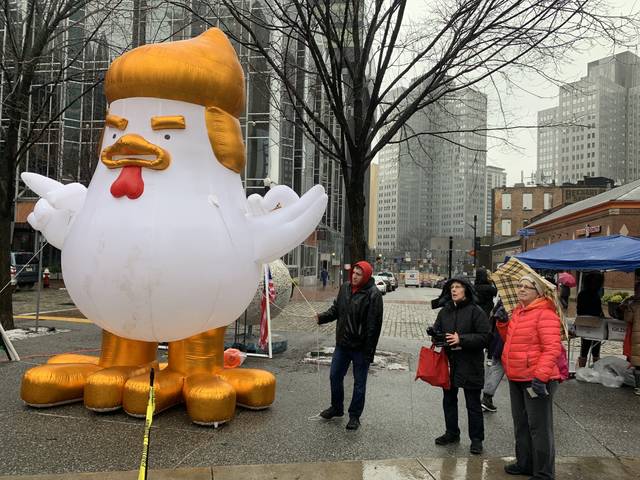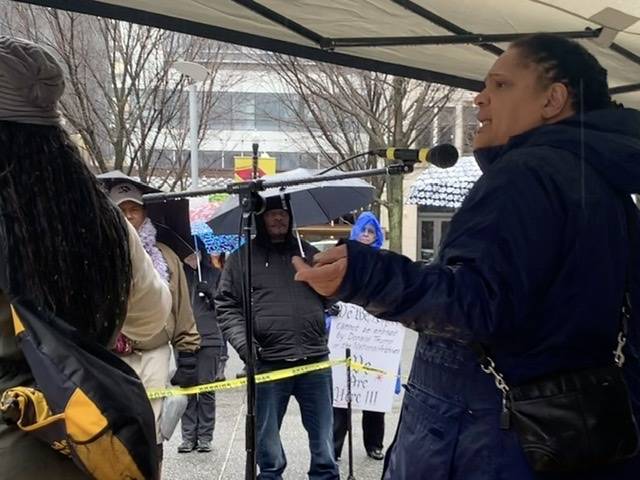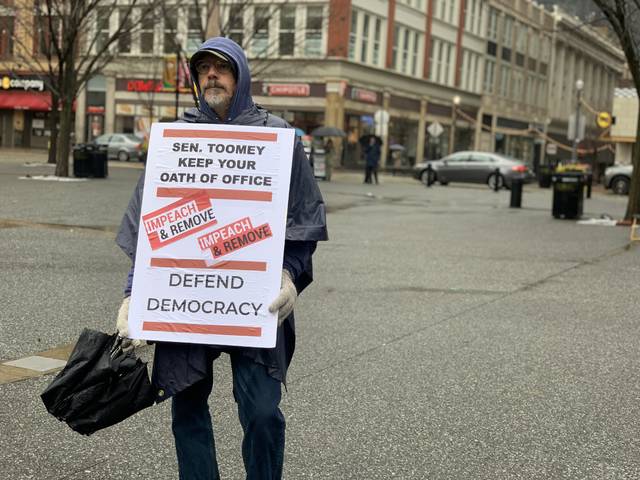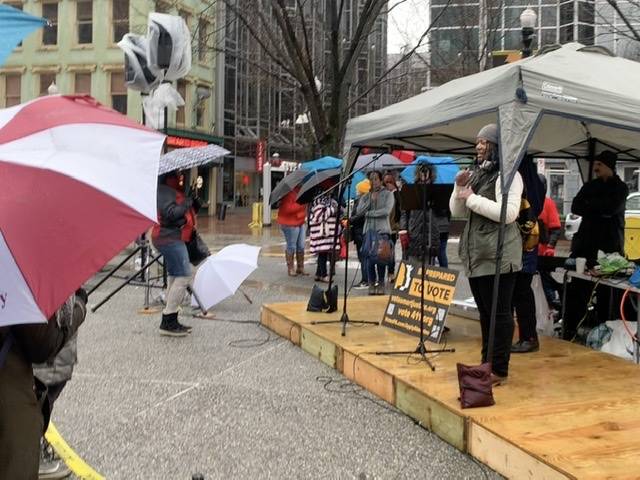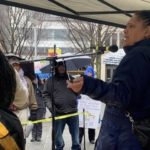Flanked by a giant inflatable chicken with orange-gold hair, Tracy Baton urged hundreds of people gathered Saturday in Downtown Pittsburgh’s Market Square to sustain momentum for the national Women’s March movement — an effort she says aims to confront the challenges that hit families closest to home.
The director of Women’s March Pittsburgh called on individuals, community groups, activists, churches and business and nonprofit leaders to work together to amplify the voices of women, people of color and others who go underrepresented in American politics and policymaking.
She emphasized the significance of such calls to action happening simultaneously in cities across the United States.
“We connect with our sisters from around the country. We learn from them, and we show that we really will change the world with our vote,” said Baton, who spoke toward the end of the three-hour event beneath a gray tent at the center of Market Square. Alongside her was a keyboardist, singer and sign language interpreter, with the chicken caricaturing President Trump as a backdrop.
Like similar rallies held in more than 100 U.S. cities, the 2020 Women’s March in Pittsburgh carried a heavily anti-Trump tone, with many continuing to raise concerns over Trump’s perceived racism, sexism, bullying and discriminatory remarks and actions.
Opposition to a potential war with Iran and conflict elsewhere in the Middle East also was a focus of this year’s local march.
Harrison man among protesters
“I very much want to get that clown out of the White House,” said retired steelworker Howard Derbaum, 69, of Natrona Heights, Harrison, who worked nearly 40 years at Allegheny Technology Inc.’s steel mill in Harrison. “I’m very anti-war. I’m very much into the idea that we need to have a world with peace.”
Derbaum said he’s not sure which Democratic candidate he likes best, but he hopes to see someone unseat Trump. Addressing climate change, thwarting wars and improving the health care system are among his top concerns. Derbaum, who also attends weekly Tuesday protests outside the office of Republican U.S. Sen. Pat Toomey, held a sign that read, “Sen. Toomey, Keep Your Oath of Office. Defend Democracy.”
Derbaum is pleased that U.S. Rep. Conor Lamb, a Mt. Lebanon Democrat, voted in favor of impeaching Trump, and to see Lamb among those attending Saturday’s event. Lamb has faced backlash in his district from Republicans and some moderate Democrats who voted for Trump in 2016.
Among other politicians who spoke at or attended Saturday’s event were Pittsburgh Mayor Bill Peduto, state Reps. Dan Frankel of Squirrel Hill and Jay Costa of Forest Hills, U.S. Rep. Mike Doyle and state Sen. Pam Iovino.
The Women’s March is in its fourth year. The crowd was a fraction of the size of earlier years, but the turnout still pleased organizers, who estimated several hundred to nearly 1,000 people showed up for the start of the event at the City-County Building on Grant Street.
A light morning snow melted away into persistent rain that drenched participants and made for a crowd that dwindled to a few dozen a few hours later in Market Square.
Baton said that since its formation, Women’s March Pittsburgh has gotten better at connecting with community resources and leaders to turn efforts into real-world solutions to problems confronting families. Participating groups this year included the League of Women Voters, Planned Parenthood and Trans United, which works to improve the lives of transgender people and their families.
The seven-member volunteer board has distanced itself from controversies brewing among affiliated Women’s March organizers at the national level.
“We have a sister relationship with them,” Baton said. “They don’t tell us what to do; we work alongside them.”
One goal is “to connect those ordinary Pittsburghers to national issues” and help people realize they’re not the only ones facing problems such as high eviction rates and displacement from neighborhoods, Baton said.
This year marked the third Women’s March for housing advocate Carmen Brown of Pittsburgh’s East Liberty neighborhood.
“There’s a lot of single mothers being put out of their houses,” she said. “I drive by the Hill District, and it’s empty. It makes me cry.”
Baton, 56, who has one grandchild and another on the way, is a social worker with Community Empowerment Association and works with families and children in Homewood and McKeesport. She said “women’s issues” span many areas, such as affordable housing, reproductive health rights, air and water quality, discrimination protections, human rights and school safety.
“It means ‘kitchen-table’ issues, real home issues, issues that lift up families,” Baton said. “Issues that are related to the social care of our society, of how we connect to each other — what is at the core of happy, decent and productive lives.
“It’s not enough to say that there’s no unemployment,” she said. “Minimum wage is so low that no one can support a family on minimum wage. That’s a women’s issue.”
The original Women’s March in 2017, the day after Trump’s inauguration, is generally regarded as the largest Washington protest since the Vietnam era.
This year was a more modest affair for multiple reasons. An estimated 100,000 protesters packed several blocks around Freedom Plaza, just east of the White House, holding a daylong rally. The march itself took about an hour and only moved about four blocks west along Pennsylvania Avenue past the Trump International Hotel before looping back to Freedom Plaza.
Parallel marches took place in dozens of cities around the country, with several thousands showing up in Los Angeles, Denver, San Francisco and New York.


